Monthly Roundup, May 2014
By majormitch 4 Comments
Things got a little “western” this May. Despite beginning with a few weeks off before school started, I didn’t have as much pure gaming time as you might think during that first half of the month, and a lot of that time was pretty scattershot. As a result, I ended up playing a small amount of a large number of “little” games that I’ve managed to acquire over the years: Super Stardust HD, Velocity Ultra, Everyday Shooter, Critter Crunch, Bit.Trip Saga, Super Hexagon, Dear Esther and Proteus were all played to some degree. Most of these I didn’t like enough to dive further into (the exceptions being Super Stardust HD and Velocity Ultra), and none of them are elaborate enough where I have much interesting to say; at least not without making this overly long entry even longer. One bigger game I also won’t elaborate on is the original Advance Wars. Despite being one of my favorite video game franchises (hence my avatar), I had never played the original, so when it recently came to the Wii U Virtual Console I couldn’t resist. That said, assuming you know anything about the series, the only thing I can say about the original is “It’s Advance Wars, and it’s awesome”. At any rate, I did actually play some games in May worth talking about, and those can be found below.
The Elder Scrolls V: Skyrim: Dawnguard and Dragonborn
I played the crap out of Skyrim when it first came out in 2011; I’m talking “over 100 hours and got all the Xbox 360 achievements” levels of playing. Then after I finished, I didn’t feel like touching anything related to Skyrim for a long, long time. I always assumed that I’d eventually get around to the game’s well received DLC, but I didn’t think it would take this long for my Skyrim hangover to pass, and yet here we are. I actually picked up the full “Legendary Edition” in a Steam sale, as it was ironically much cheaper than buying just the DLC on the Xbox 360. This led to me starting a brand new character on a better looking platform, which set the stage for a clean return to Skyrim: I played through Dawnguard in February, and wrapped up Dragonborn this past month.
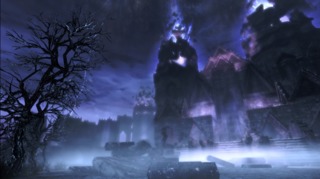
The return came with mixed feelings, however, as I’ve found over time that Bethesda’s style of open world game has diminishing returns for me. Oblivion was the first game of theirs that I really dug into, and I loved it. I’ve subsequently enjoyed Fallout 3 and Skyrim, but the more I play them the more the magic wears off. Bethesda remains unparalleled at making big, interesting worlds full of stuff, and I think Skyrim is easily their densest and most polished effort yet. But much of that stuff remains very thin and insubstantial when taken on its own merits; the enjoyment comes from simply having something to do in such a large and expansive world. Returning for the DLC has made this even clearer to me, as I frequently found tedium within the game’s various tasks. Many quests boil down to generic fetch quests or dungeon crawls, which don’t have enough variety or engaging enemies to support the game’s simple combat for dozens of hours. The storytelling and writing can also frequently be sophomoric, often needlessly conjuring another silly MacGuffin to seek out. Perhaps worst of all is the crafting. I naturally want to make statistically better gear, but I’ll be damned if I ever waste time crafting another iron dagger ever again. Granted, all of this is true of a lot of games, but perhaps it stands out in Skyrim because there’s so much of it.
I found all of this to be at its worst in Dragonborn, which to me is the weaker of the two DLCs. The primary questline boils down to a mundane “There’s a bad guy doing bad things so we need to kill him”, and along the way you experience the full suite of generic Skyrim quest types. Dragonborn does add a new island to explore, but I don’t feel like it added anything worthwhile to the already enormous landmass found within vanilla Skyrim. In short, it feels like more Skyrim where more Skyrim is not needed. Dawnguard is largely the same, but I feel its primary questline is one of the better ones in the entire game. The characters involved are more interesting, with more developed motivations and personalities (relatively speaking), and the writing and plot are slightly more nuanced than average. The quest structure still suffers from the same old problems, but I found the context to be more engaging, and one of the locations you visit is visually really impressive. At any rate, despite all the griping, I did have fun revisiting Skyrim’s world on the whole, but the aftertaste has me wondering how much more of Bethesda’s style of game I really want to partake in in the future. Something to consider before the inevitable Fallout 4 drops.
BioShock Infinite: Burial at Sea
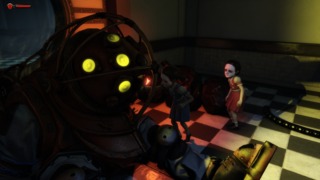
I’m not going to say too much about BioShock Infinite’s premier DLC, Burial at Sea, as it’s an easy one to spoil, and the narrative is the only good reason to play it. I also don’t need to say a lot to get my points across, because everything other than the narrative is the same BioShock Infinite you’ve likely already played. The combat (especially in Episode 1) remains pretty dull for the most part, though Episode 2 freshens it up a bit with some fairly neat stealth ideas. But when it comes down to it, Burial at Sea is all about giving the “BioShock” franchise a proper sendoff from the now defunct Irrational Games. To be honest, when I originally heard this DLC was going to send Booker and Elizabeth to Rapture, I thought it sounded more like a cheap marketing tactic than a legitimately interesting narrative hook. And through Episode 1 I was proven right, as the episode is nothing but BioShock Infinite’s combat in the original BioShock’s setting, doing little more than saying “Hey, remember this place?” I found that first episode an extremely boring waste of time, and was feeling pretty down on the DLC upon its conclusion. But to my surprise, Episode 2 does a complete turnaround. I won’t say it redeems Episode 1, but Episode 2 goes to great lengths to justify the return to Rapture. While it’s by no means perfect, and is still plenty pandering, it connects the two games in interesting and profound ways that had me wanting to see where it went each step of the way. I was satisfied with how it all eventually wrapped up, and even if Burial at Sea showcases two wildly different halves, I think it’s ultimately worth seeing through for fans of the series.
Transistor
Part of me wanted to write about Transistor purely on its own terms, but it quickly became clear that I couldn’t avoid making comparisons to Supergiant Games’ previous work, Bastion. Despite being a mere two games old, that team has already established its own clear style that’s very much present in both of their games, and so far it’s a style I’m really liking. I consider Bastion an all-time favorite, and even if I don’t like Transistor quite as much as its predecessor, it still executes on a number of incredibly interesting ideas and mechanics in ways that connect with me more than most games. Much of what Bastion did so well is replicated in Transistor: this is a super crisp action game that smartly incorporates well considered RPG elements, and wraps it all in a slick presentation and a whole lot of heart. Chances are if you like one, you’ll like the other.
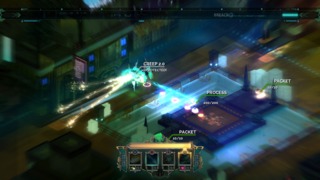
There are plenty of subtle differences between the two games though, many of them found in the way combat works. While you can play Transistor purely as a real-time action game, you also have the ability to pause combat at any time and queue up a series of moves; think of something like Fallout 3’s VATS system. It lends an interesting tactical nature to the combat, and it feels a little more natural than the real-time action, which isn’t as smooth or responsive as it was in Bastion. Ultimately, however, which way you choose to fight seems most dependent on what skills -- or as the game calls them, functions -- you are using. Each of the game’s sixteen functions does something drastically different, and I think the game’s coolest aspect is how you’re able to combine said functions in a myriad of ways. Each one has three different ways it can be used: It can be an “active” function that you use in combat, it can be used to augment an active function with an additional property, or it can be equipped as a passive function to provide some sort of boost. The sheer number of builds you can create with this template is pretty mind-boggling, and I had a ton of fun just experimenting with it all. It’s especially great because each of the functions provides radically different functionality, and I think that variety is one of the best staples of Supergiant’s games so far. Most games are content to just raise the stats on your weapons and call it a day, but Bastion and Transistor go to great lengths to make sure every new thing you get is a markedly different and unique addition. This philosophy is also applied to the enemy designs, and the result is much more dynamic combat that evolves as you play past things simply becoming numerically stronger. This approach combined with the extreme levels of customization made Transistor a game I found highly engaging from beginning to end.
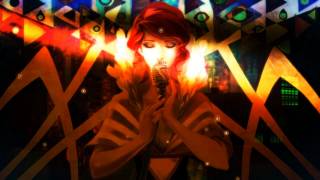
Past the great combat, Transistor looks and sound absolutely incredible, much like Bastion did. I think there’s a slight trade-off here though. For as good as Transistor’s soundtrack is, I don’t think it’s as consistently excellent as Bastion’s. Many of the instrumental tracks seem to lack a soul of their own, mostly blending into the background. The handful of vocal tracks are really something, however. I feel like they form the thematic and emotional center of the entire game, and I like them much better than Bastion’s vocal tracks (which were already amazing). On the other hand, while Bastion was no visual slouch, I think Transistor looks leaps and bounds better. In fact, from an artistic standpoint I genuinely think Transistor is one of the most visually impressive games I’ve played to date. The city of Cloudbank is a striking local, with bright colors and a high attention to detail that really bring it to life. If you’re an astute observer you could learn a whole lot about this city just by paying close attention to the environments, and I like how the game’s computer/programming theme defines it so thoroughly and consistently (both artistically and mechanically). The character portraits look fantastic as well, and do a lot to imbue them with personality, which is furthered by their awesome voicework. All told, it’s pretty insane how much audiovisual talent is contained in this small team, and it really serves to inject the game with an imaginative, personal touch.
Finally, the one aspect of Transistor that didn’t really click with me is the story itself. The central plot is fine enough, but I always felt like there was something more I was supposed to be getting from it. In a way, Transistor carries itself in a somewhat opaque, artsy manner not too dissimilar from a poem. I feel like every detailed piece of imagery, and every line of dialogue or writing down to the word is there to lend some insight, or contribute to your own interpretation of what’s going on. I’m personally not a big fan of that kind of literary analysis, and even if it worked fine in a poem that was a dozen lines or so long, I’m not going to spend hours dissecting every little nuance in between playing a longer video game. It left me feeling like I was constantly missing something, and the disconnect it created wasn’t helped by the frequent audio logs and data terminals that require breaks in the action to digest. These add welcome flavor to the world, but are handled in a way that disrupts the game’s flow. At any rate, these narrative “missteps” are the only notable downside to a game I enjoyed quite a lot on the whole. Transistor is a wonderful game that I couldn’t stop playing until I consumed it in its entirety, and is a very easy game to recommend; especially if you liked Bastion.
Infamous: Second Son
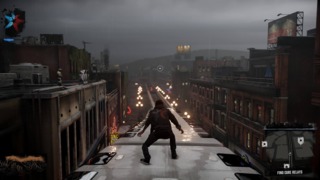
I really liked the original Infamous, and at the time it was one of the only open world action games I had ever enjoyed. Infamous’ level of control and snappy action made the act of playing it a lot more satisfying than other comparable games, which helped me put up with some of the tedium and repetitiveness in open world design. I skipped Infamous 2, which came out a little too soon after I finished the first, but I was ready and willing to dive back in for Infamous: Second Son. Not least of all to play something shiny on my PlayStation 4, which I hadn’t touched during the first four months of the year. Fortunately, Second Son makes welcome use of the hardware. It’s a gorgeous game, with fluid animations, crisp lighting and a high attention to detail bringing Seattle to life. In fact, I became more impressed with the game’s visuals over time, as I continued to notice how much they were able to pack onto the screen while maintaining those good looks. It also ran super smooth for me throughout, though I did encounter my share of bugs. They primarily came in the form of pathfinding and clipping, most noticeably the fact that I literally got sucked into a piece of geometry on two separate occasions. Both times I feared I was going to have to restart the game, but to my surprise it worked itself out, and reset my character on its own after a few seconds. Take that for what you will.
Otherwise, Second Son is totally an Infamous game. That means fun powers, fun combat, a fun world, and a pretty fun but cheesy comic book style story. After a slow start I did end up liking the characters and story by the end, even if I wouldn’t call them particularly well done (though not bad either). Ultimately, however, it really is Infamous’ fast paced combat and breezy traversal that make it a more likable open world action game for me, and I feel like the world and missions service those strengths. In most such games I feel bogged down by the sloppy combat and tedious traversal, and I get tired of quest design that makes me feel primarily like an errand boy. The Infamous games put combat front and center, and they know how to make their combat worth that spotlight. Second Son follows in those footsteps, and it joins the original as one of the few open world action games I’ve genuinely enjoyed.
Looking Ahead to June
I’ve already picked up and started playing Mario Kart 8, but otherwise June is… well, pretty bare; Valiant Hearts: The Great War is the month’s only scheduled release that’s caught my eye so far. Thus begins the annual summer gaming drought, which is a period of the year I tend to love. I’m free to catch up on games I’ve missed, and with my class schedule being relatively light for three more weeks, I might make even more headway on that front that usual. At the top of the list is Patapon 2, followed a long game I’ve wanted to get to for a while, Tactics Ogre: Let Us Cling Together. June seems like the perfect month to dive into that one, and given the time I have plenty of other ideas as always!
